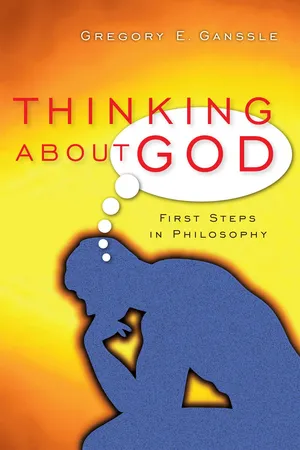Another book about God? Why bother? With thousands of books (and thousands of gods) on the market, why write another one? You might be thinking that since I am a philosopher, I have no life. All I can do after all, is think. Philosophers cannot do anything else. We do not do lab experiments. We have no expensive equipment. We just think. Since thinking looks like doing nothing, we try to write our thoughts down. At least if we are writing, it looks as though we are working. Usually we think about what other philosophers have thought about, and we write our thoughts down hoping still other philosophers will read them and think about our thoughts. Generally we think that our thoughts are right, and we hope to persuade fellow philosophers that we are right about being right. All the while, our fellow philosophers, who often are our friends, are doing their own thinking and writing their thoughts down and hoping to convince us that their thoughts are right. Sometimes philosophers persuade other philosophers to change their minds. Sometimes they do not.
Why bother with another book? More to the point, why bother with this sort of book? Let me tell you why I bother. Many philosophers have a secret dream. We think that we are good at thinking, and we dream that maybe we can help other people think better. We dream that real people—normal people—might read something we write and be better thinkers as a result. So sometimes philosophers write things with regular people in mind. Nowadays, of course, philosophers think usually about the thoughts of other philosophers and write things so only other philosophers will care to read them. It was not always this way, however. This trend is rather late in the history of philosophy. Most of the history of philosophy consists of people thinking about things and writing or discussing them in a way that allowed lots of people to take part in the conversation. I write this book because I also have this dream. I would like to help some people think better about things that they probably think about a little bit anyway. This is why I bother to write.
Just because I have a reason to write, however, does not mean that you have a reason to read. After all, you are the one who is holding this book and reading this sentence. There is a good chance that you are thinking about putting it down. You know why I bother to write, but why should you bother to keep reading? This question is a good one. Given that this is a book called Thinking About God, there are two parts to the question. First, why bother thinking? Second, why bother thinking about God?
Why bother thinking? Thinking is a bit unusual today. Actually it is more than unusual. It seems to be out of style. I suppose it is not thinking itself that is out of style, but thinking in public or admitting that you do think or need to think. Let me tell you a story that shows that I am right. If you watch a press conference on TV or one of those talk shows that discusses current issues (never mind the ones where fistfights break out), there is one thing that you will never see. You will never see a participant think. It does not matter if it is a politician answering questions, a journalist asking them or the commentators commentating on them, you will never see any of them say any sentence resembling this one: “Gee, my opponent has made a very good point, I will have to give it some careful thought.”
There must be some reason that we never hear sentences of this type. I am not sure what the reason is, but I have two theories. My first theory is a bit more charitable than my second. This theory is that we do not hear people stop and think or even admit that they need to think because all of the people in the public eye have done all of their thinking already. They spent the first half of their lives thinking through all of the tough issues, and now they do not need to think anymore. They can respond instantaneously and with confidence to any conceivable question or challenge, and they never have to change their minds.
My second theory is, I am sorry to say, a bit cynical. We never hear public figures admit that they need to think because they are of the opinion that thinking shows weakness. If I have to pause to think, others will begin to get the idea that my opponent might be right, and I cannot allow that to happen. I do not mean this theory to apply only to politicians. It applies to public figures in every field. Entertainers also do not think in public. I have never seen an actor or actress, after winning some award, respond to the journalist’s question about what comes next with anything like the following answer: “I am really pleased to win this award, and now I want to take some extended time to reflect on the nature and application of virtue in contemporary life.”
Admitting that you think, you see, is a bit out of style. Even though thinking is out of style, there are some reasons to do it anyway. First, styles change. You never know when thinking will come back into style, and you want to be prepared. Second, you may not believe me, but all of the cool people think. If you want to be cool (and I know that you do, even if you will not admit it), then you had better think too. Now you might think that this second reason is not a very good reason. I agree. I bring it up because it leads directly into my third reason that it is worth the effort to think. The third reason is that you cannot help it. You must think. You always think. You cannot refrain from thinking. How do I know that these claims are true? You see, you are thinking now. I know you are thinking now because you thought my second reason was not very good. Therefore, you considered it and weighed it against some idea of what counts as a good reason and what does not, and you concluded that it came up short. You were thinking the whole time. I caught you. Since I caught you red-handed, you might as well admit that you think.
What is the point? If you cannot help but think, you want to think as well as possible. You want to believe things for good reasons and not for bad ones. You want to be able to evaluate reasons to see if they are good or bad. So, even though it is not popular to admit that we think, we all do it. We might as well bother enough to do it well.
Why think about God? After all, no one knows whether there is a God, much less which God is real. Well, I am not as sure as you that no one knows. If God exists, then he knows, to be sure. He would have no identity crisis. Besides, we ought not claim that no one knows that there is a God until after we have done our thinking about God. So one reason to bother thinking about God is to see if you can find good reasons to think that there is a God. Another reason is to see if you can find good reasons to think there is no such person as God.
There are other reasons to think about God besides trying to figure out if there is such a person. What you believe and think about God affects nearly every area of your life. Many of the big and deep questions that shape how each of us sees the world are very closely related to questions about God. For example, it is a big and important question whether life has any meaning or purpose other than whatever meaning we give it ourselves. If we push this question very far, we will wind up thinking about God. If there is a God who created us and knows us, then whatever purpose we have will probably be related to whatever purpose he has for us. Another big and important question has to do with the nature of moral reality. Are there things that are right or wrong regardless of the opinions of others? Again, if God has a purpose for us, it might be that his purpose involves our living up to or reflecting moral reality. You can see that the question of God is a central question. If we want to think well about our lives, we will want to do some of our best thinking about God.
So in this book we will think about God. We will think about what God is like, and we will think about reasons to think there is such a person as well as reasons to think there is not. I invite you to do the thinking about God and not just to let me do the thinking for you. Along the way you will find that I say things that you think are wrong. I hope that I will say other things that you think are right. Before we begin to think about God, however, we need to clear some ground so we can think well. In the next few chapters we will think about some issues that will help us see straight and think well.
This book is called Thinking About God: First Steps in Philosophy. When we undertake to think about God, we are doing philosophy. Philosophy is the name of an academic discipline, but it is also a kind of activity. Now philosophy brings to many people’s minds strange pictures such as that of a robed guru sitting on top of a mountain reciting deep but obscure phrases. I do not think that this picture of philosophy is very helpful. (I am not much of a mountain climber and robes make me look fat.) What is philosophy anyway, and how does a person do philosophy? Let me tell you a story that will illustrate what philosophers do.
Do you remember the TV show Star Trek? I know there have been several different shows of the same type. In each one, there is a starship. In nearly every episode some group of the crew meets at the transporter room and is “beamed” to the surface of a planet. They stand in the right place in this huge machine and the engineer flips the switch. Usually a tinkling noise follows along with some special effects. Then the crew disappears. The camera cuts to the surface of the planet while the same noise and effects occur and the crew materializes on the planet. They have been transported from the ship to the planet. It is quite a helpful device to have for interplanetary travel.
Well, if you take an engineer and a philosopher aboard the starship Enterprise and show each of them the transporter, they will ask the same question: “How does it work?” They will want to know different things, however. The engineer will want to know all about the mechanics of the machine, that is, the technology. The philosopher will want to know why we think the person who appeared on the planet and the person who was transported from the ship are one and the same.
The engineer will want to know what it is about the machine doing the transporting that makes the transportation possible. The philosopher will want to know what it is about the person being transported that allows him or her to be transported successfully. In other words, what are the conditions that must be satisfied in order to be sure that the person we call “Captain Kirk” who appears on the planet is really Captain Kirk? We all agree that it is Kirk on the planet. The philosopher wants to know what makes it Kirk. You see, if the transporter works, then how it works will give us some clues about what it means to be a person. Let us think together about a few possibilities.
Suppose the transporter works this way. First, it carefully takes Kirk apart while recording in great detail every step of the process. Next, the transporter takes these biological parts (let us say they are molecules) and ships them to the planet. Once they arrive on the surface, the pieces are put back together according to the strict information that was recorded. So every piece is placed in the exact position and in the exact state of motion it was in before Kirk was dissolved. In this system, the transporter beams both information and material. We can call this the “information-and-guts method.” If this is how the transporter works, we might be tempted to think that the particular molecules that make up Kirk when he is on the ship are crucial to who he is. In order to be Kirk on the planet, he needs these molecules.
Another possible method is that the transporter dissolves Kirk but sends only the information to the planet. The transporter then assembles Kirk out of whatever materials are available. Presumably there is an ample supply of just the right organic compounds nearby. In this case, only the information is beamed down, and so we call it the “information-only method.” If this method is the correct one, then it is not too much of a stretch to say that Kirk is e-mailed or faxed to the planet.
Now, knowing what you know about the transporter, how do you think it works? Let us look again at the information-only method. If the transporter operates in this way, what do we learn about human beings? We learn that the specific molecules that make up a person (such as Kirk) are not necessary to that person. All that is necessary to get a person is that there is enough of some material that can be put together in the right way. Let us pursue this further.
Suppose there is a malfunction in the transporter room, as usual. As the transporter gathers the material on the planet in order to reconstruct Kirk, it gathers the wrong elements. Rather than building a Kirk out of carbon-based organic molecules, the transporter puts together a silicon-based complex living person. The person looks like Kirk. He talks like Kirk, and he acts poorly like Kirk. Is he still Kirk?
Stop for a minute here and come up with an answer. What do you think about the silicon captain? Is it our beloved Kirk? If you think so, why do you think so? If you do not, why don’t you? If your answer is correct, what is it that we learn about human beings?
Now what happens when Kirk is beamed back to the Enterprise? Does the transporter then bring together the original molecules and reassemble Kirk by using the information? In this case, Kirk again has his original body. Of course, if the information-only method is correct, we do not need to use Kirk’s original molecules. We can use anything we have lying around, as long as the material is adequate for organizing a person according to the complex information that makes up our illustrious captain.
If we do not need the original molecules, what do we do with them? Suppose Kirk is beamed to the planet and the ship’s doctor, Dr. McCoy (“Darn it, Jim. I’m a doctor, not an actor”), decides to put Kirk’s original molecules back together while Kirk is on the planet smooching some alien disco queen half his age. McCoy retrieves the information from the transporter and constructs Kirk in his lab. So now it seems that we have Kirk on the planet, torn between love and the prime directive, and Kirk in McCoy’s office, filling our federati...



